Evaluating Your Solar Panels System for Safety
Imagine a world where you wake up to a beautiful sunrise and your house is full of energy that doesn’t cost much. That’s what you can do with the power of the sun. But there’s an important step to think about before you jump on this bright bandwagon. It’s the evaluation of the site done by a reputable solar company.
You might be wondering, “How many solar panels do I need?” Or, “Would this even work on my roof?” The answer to all of your questions is in the site assessment.
Assessing the sun: Step into the World

Most of you might not know what RLC means, but it’s really not that hard to understand. It stands for Resistance, Inductance, and Capacitance, which are three basic parts of an electrical circuit that work together. I think of an RLC circuit in the same way that solar companies do site assessments.
A well-done site assessment takes into account many things, like how resistance, inductance, and capacitance work together to make a circuit work. It’s not just a matter of counting panels and figuring out the costs. It means figuring out how your roof is in, how much sun it gets, how much shade it gets, what the rules are in your area, and how much energy you use. All of these things are important for a smooth solar energy experience.
Let's Set Up a Tent: Location Is Important
You know how where you put a tent is the most important thing? On a camping trip, you find the perfect flat spot, but you don’t look up to see if there are any tree branches. At night, the wind picks up, and branches start to scrape against your tent. Your quiet night is over. Solar panels work the same way. During site assessments, placement is one of the most important things to think about. The location, angle, and direction of your roof can have a big effect on how well and how much your solar system works.
Learn about attrition and why your solar power yield may go down.
Solar panels wear down over time, just like everything else. Imagine a new worker at a place of business. At first, they are eager and excited, and their productivity is through the roof. But as time goes on, the same worker may start to lose interest. In the same way, solar panels can lose efficiency over time. The rate at which this happens is another important thing to think about when evaluating a site.
"How many solar panels will I need?"
This is the question worth a million dollars, isn’t it? And the answer, as with most things in life, is “It depends.” A solar company will look at your past electricity bills to figure out how much energy you use. Then, they will look at how much sunlight your area gets. By putting these things together, they can estimate how many solar panels you would need. Don’t forget that it’s not a one-size-fits-all answer, but a solution made just for you!
How to Get Ready for a Site Visit
You should get ready for the site assessment before the solar company comes to your house. Start by gathering your electricity bills from the past year. This information will be very important for the people who are judging. Also, think about your plans for energy in the future. Are you thinking about getting an electric car or a Jacuzzi that needs a lot of power? Make sure the assessors are aware of these plans. After all, they are here to make the best solar solution for YOU!
In the end, a solar site evaluation is more than just a formality. It’s an important step that will help you get the most out of your money. The solar company can give you a solution that is just right for you if they know what your needs and situation are. Isn’t that something to look forward to as you learn more about solar energy?

Authored by Ryan Douglas
NRG Clean Power's resident writer and solar enthusiast, Ryan Douglas covers all things related to the clean energy industry.
